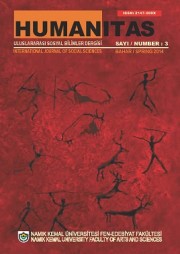VICTORIAN CRITICS AND METACRITICS: ARNOLD, PATER, RUSKIN AND THE INDEPENDENCE OF LITERARY CRITICISM
VICTORIAN CRITICS AND METACRITICS: ARNOLD, PATER, RUSKIN AND THE INDEPENDENCE OF LITERARY CRITICISM
Author(s): Petru GolbanSubject(s): Literary Texts
Published by: Namık Kemal Üniversitesi Fen-Edebiyat Fakültesi
Keywords: Victorian Age, Approaches to Literature, Literary Criticism, Literary Theory, Literary History, Metacriticism, Critic, Metacritic, Writer-Critic.
Summary/Abstract: The Victorians provide the last major step in the advancement of English critical theory before its twentieth century establishment as a scientific and methodological discourse. It is also true to assume that Victorian criticism represents the transition to or culminates in modern literary theory and criticism. In the nineteenth century, the co-existence of different artistic and literary trends during one period leads to the separation of criticism from literary process. The separation of criticism from literary practice is also a result of the diversity of literary forms. But primarily the independence of criticism from literature is acquired by creative and critical writing confronting and falling under the influence of diversity and complexity of philosophical thought, social theories and scientific advances, where critics attempt to assimilate science to literary criticism. The route of criticism towards independence from literature means its own diversification and organization as a typology: although it is almost impossible to categorize Victorian criticism, it is Romantic theory still being influential, to which biographical, sociological, historical, positivist, realistic, naturalistic, impressionistic, aesthetic, moral, humanistic, and other types of criticism are added. The diversification of the critical systems in the Victorian Age is the result of the massive presence of different critical voices belonging to both professional critics, like John Ruskin, and writer-critics, like Walter Pater, Matthew Arnold and Henry James. Among others, they are critics focusing on art and/or literature as well as metacritics providing critical commentary on criticism. To reveal the significance of their critical status and disclose their ideas showing the condition of Victorian criticism represent the aim of the present paper.
Journal: Humanitas - Uluslararası Sosyal Bilimler Dergisi
- Issue Year: 2/2014
- Issue No: 03
- Page Range: 47-68
- Page Count: 21
- Language: English

